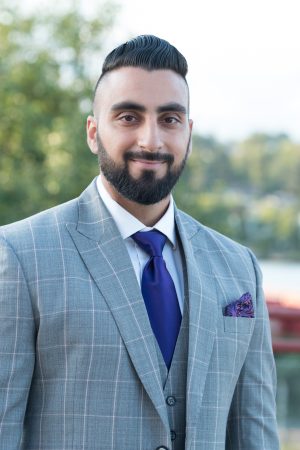As a former security guard on an inpatient psychiatric unit and a hospital emergency department, a personal trainer and a kinesiologist, Occupational Therapy graduate Aman Rangi has seen the many different ways that physical and mental health intersect.
This experience led him to the Master in Occupational Therapy program at UBC and helped to shape his research interest in how sensory modulation rooms are experienced by patients and health care providers.
Here, he shares more about how his experience led him to pursue occupational therapy and the advice he offers for prospective occupational therapy students.
How did you become interested in a career in occupational therapy?

Aman Rangi
I was always interested in a career that integrated different aspects of health, but I was open to different career paths. While I was an undergraduate student in Kinesiology at UBC, I worked as a security guard at a hospital. Working on both an inpatient psychiatric unit and in the emergency department, I got a lot of exposure to people with mental health and substance use challenges, many of whom were in crisis. I started to wonder about how engaging these patients could help them to cope and to adjust.
I made the connection to occupational therapy after I graduated, when I was working as a kinesiologist for ICBC. There, I saw how occupational therapists help people through real-world strategies, which was really interesting to me. I chose UBC’s occupational therapy program because saw that there is a huge focus on case-based experiential learning. I knew we would be learning through doing.
At the start of the program, did you know what area of occupational therapy you wanted to focus on?
When I came in to the program, I was very open to different learning experiences. At the start, I saw myself as working in rehabilitation or in phys med. Mental health was also interesting, but I didn’t know the full extent of the role of occupational therapists in that area until I had a mental health unit in the program. That experience was eye-opening. With one exercise we did, we mapped out health on a continuum. Through that exercise I came to realize that there is always a mental health component to overall health. That’s when I felt the pull of mental health.
Mental health was the focus of your graduate research project, which looked at occupational therapist and psychiatric inpatient experiences of sensory modulation rooms. Tell us more about that research.
My research partner and I were looking at staff and patient perceptions on the use of sensory modulation rooms in acute healthcare settings.
At any given time a person’s senses are giving them information about their environment. Sensory modulation rooms are a space where patients can engage in different sensory interventions to activate or to soothe, depending on their needs. It’s very individual to the person. Examples of sensory interventions are things like weighted blankets, rocking chairs, fidget toys, soothing sounds, or different scents.

Fidget toys can be used for sensory modulation
What did you find out through your research?
We realized that there is definitely a need for more research into sensory modulation. Sensory modulation is an evidence-based strategy and if there is more research done, we can point to that research to demonstrate the effectiveness of sensory modulation rooms and to help encourage health care workers to recommend them.
We also found that there is a need for ongoing education of staff on the use and availability of sensory modulation rooms as a resource for their patients.
What have you been doing since finishing the program?
I wanted to experience working as an occupational therapist in both a public and a private setting, so I am working three days a week as an occupational therapist on an inpatient psychiatric unit and two days a week doing rehabilitation for ICBC and WorkSafe B.C.
What advice would you offer prospective Occupational Therapy students?
As health care professionals we have such a privilege to make a measurable difference in the lives of our clients and patients. Because of the nature of our education, skills and experience, we have a different perspective. Something that is relatively small can have such a large impact.
If you focus on the process of learning, rather than the outcome, you will learn the skills and also do well. Sometimes you think you know what you want, but be open to new experiences and to changing your mind. The ability to adapt is especially important in healthcare – you never know what is going to happen.